#that is inspired by miao people
Photo
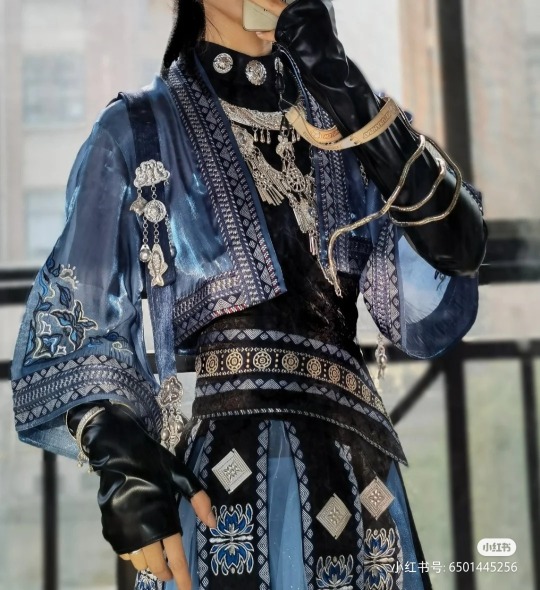
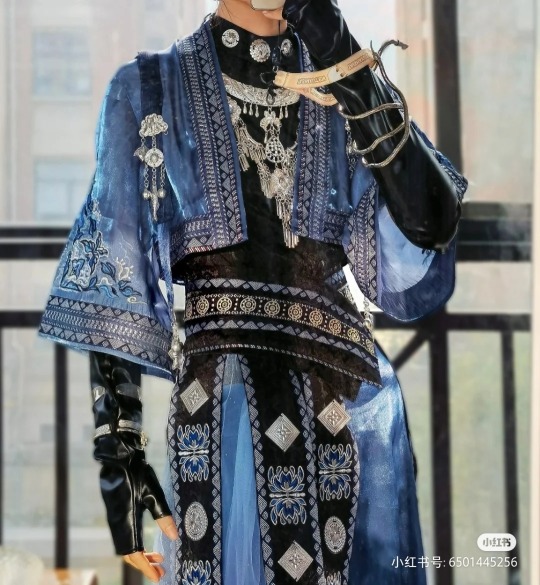
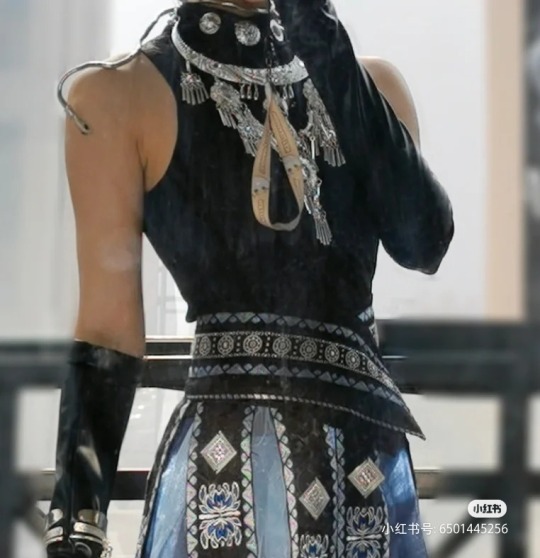


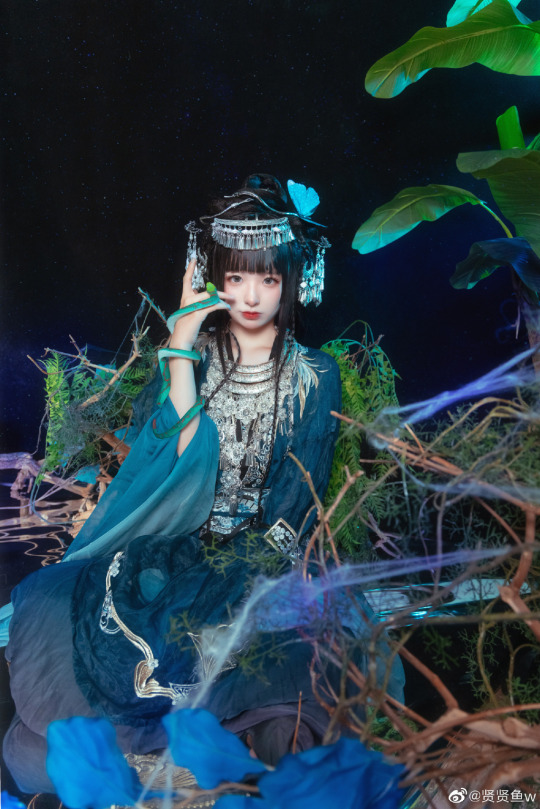
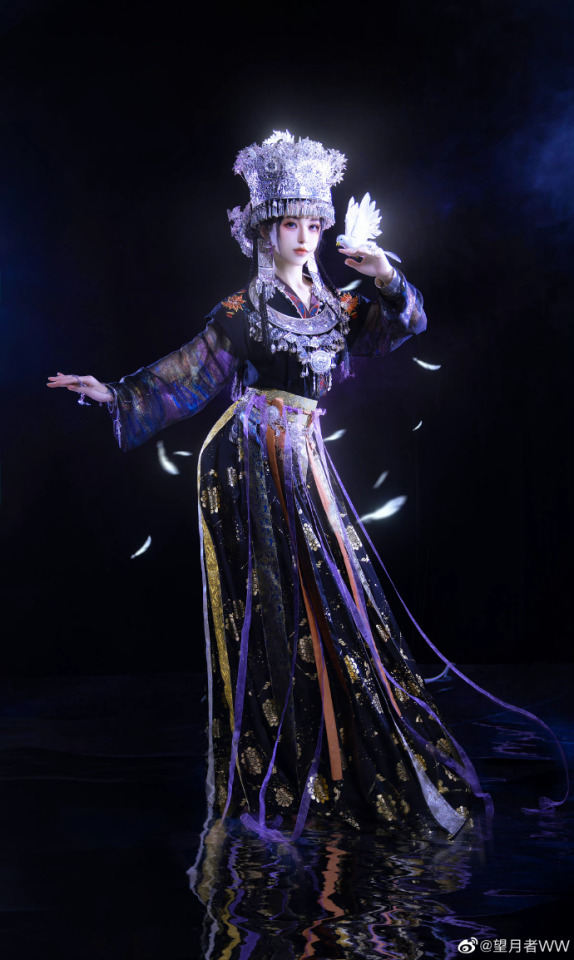
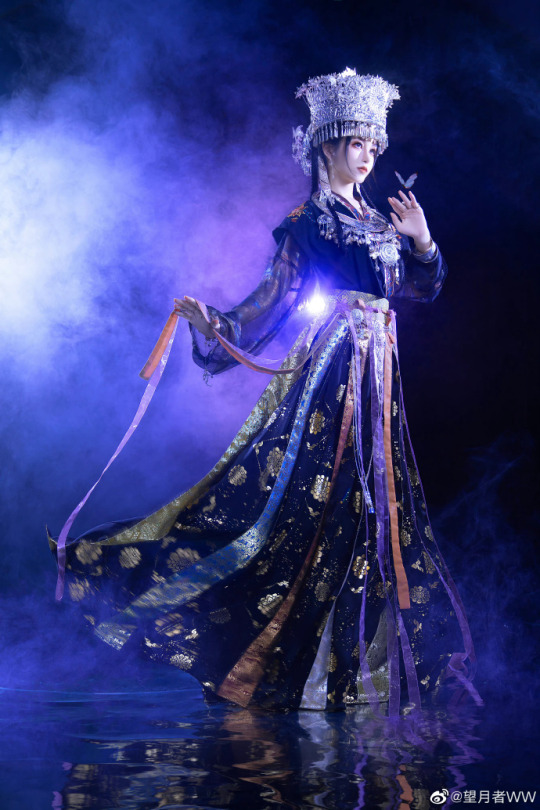
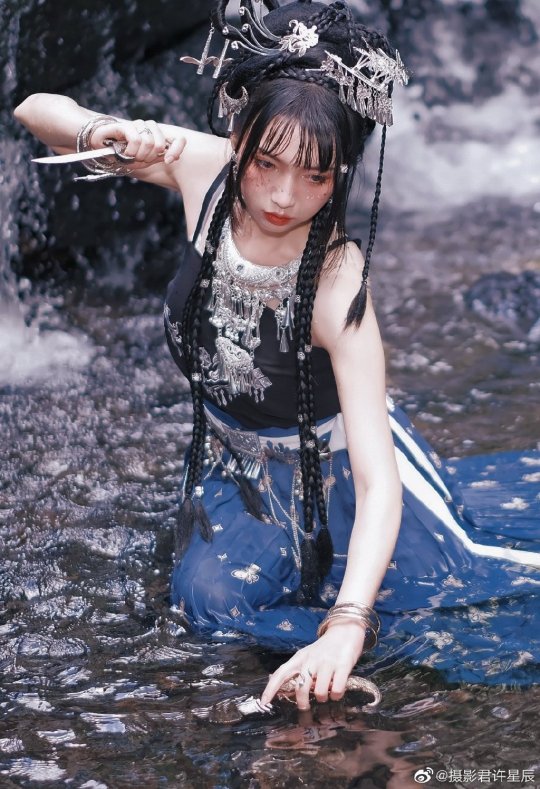
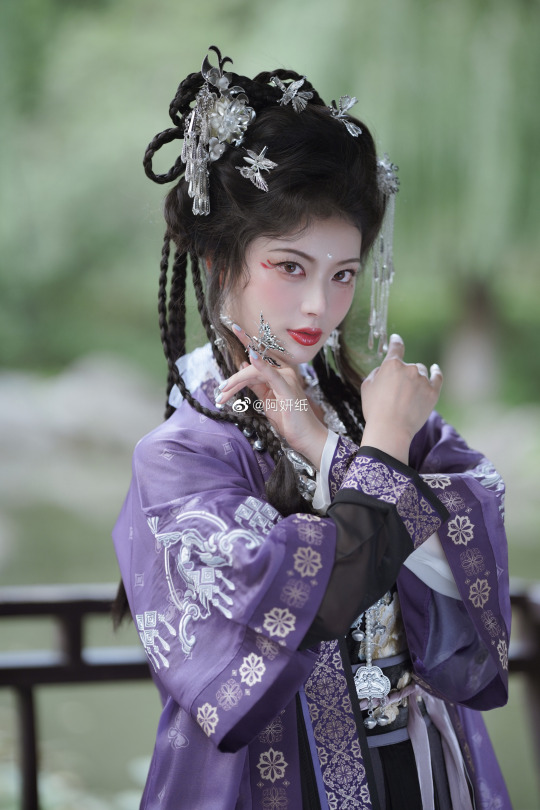
hanfu fashion matched with miao fashion by chinese designers
#china#hanfu#fashion#chinese fashion#miao fashion#designers call this type miaojiang style#miaojiang苗疆 is a concept originated from wuxia culture#wuxia mmorpg game usually have a martial art school called 五仙教 or 五毒教#that is inspired by miao people#miaojiang style is influenced by character design of these mmorpg game#the animals and insects elements such as small snake#butterfly#spider etc. are related from 五毒wudu#it symbolizes the 巫蛊wugu culture of 五毒wudu in wuxia fictions and games#credit as watermark
2K notes
·
View notes
Text
Hua Cheng’s Design
Source: 孤世中逢影 Gu Shi Zhong Feng Ying (weibo) on Hua Cheng’s design as based on Miao ethnic group culture - with snippets from a Chinese Documentary on Miao Ethnic People and an interview with Shi sifu, one of the last traditional Miao silversmiths - Sina TV.
Translator: Sythe / NPD Khanh
Hua Cheng’s character design. As we all know, the image of Hua Cheng was established based on the Miao ethnic group, so let's see the specific origin of things on Hua Cheng’s person.
1. Red umbrella:
The red umbrella in Miao culture is one of the indispensable props at marriage and celebrations. The red umbrella symbolizes great auspiciousness as one’s desires, numerous children and grandchildren, sheltering from the wind and rain, exorcising evil spirits, and shielding people from disasters. All of these together are a perfect fit to represent the blessings of the heavens (Tian Guan Ci Fu, the name of the novel) with no taboos or misfortunes.
At the same time, in the opening episode of Tian Guan Ci Fu, Xie Lian mistook Hua Cheng for a bridegroom ghost. The situation fits perfectly like a miracle as a red umbrella is required for a wedding.
2. Silver butterfly, maple leaves.
The Miao people have long had an ancient song, "Feng Mu Ge" (Song of the Maple Tree), to praise the beauty of life. The Miao people also consider butterflies as the ancestral mother, who can bless the village to be peaceful, the children to thrive, and the nation to flourish.
Maple leaves and butterflies represent rebirth, and reincarnation. These motifs can be seen in the culture of the Miao people everywhere, from clothes to jewelry to household decorations. The most famous is the Hong He area, located in an autonomous district of the Miao ethnic group in Yunnan. Whether it is nature or people, maple leaves and butterflies are popular, cherished symbols.
ps. The butterfly decoration that the author saw while traveling in Yunnan is also an inspiration.
"When I was traveling in Yunnan, there was a butterfly decoration in front of the hotel elevator,” Mo Xiang looked at it and thought. After a while, she said proudly, "He will raise a kaleidoscope of butterflies." (From MXTX Author’s Notes and Interview)
3. Silver Jewelry
This goes without saying much, silverware is an important component of Miao culture, "the more beautiful, the better;” "Miao people’s iconic silver jewelry is used to pray for peace and as a token of love or a proposal of marriage.” Speaking of which, Hua Cheng’s character design is based on ethnic Miao people. Of course, the same jewelry is used. The inheritor of the art of Miao silversmithing, Shi sifu, also said, Hua Cheng is steeped in Miao Guang symbolism and aesthetics.


4. Other
If you read the novel, it’s not difficult to figure out:
Huacheng used a red umbrella because when he was young and weak and had nothing. Xie Lian gave him a red umbrella to shield him from the wind and rain.
Hua Cheng uses corral beads because this is one of Xie Lien's lost earrings. In Taoism, coral represents the heart. Taking this into account, Xie Lian in the book had two corral earrings. The implication of this symbolism then becomes quite enticing.
Hua Cheng strung the red string of fated love because, during the Gentle Fragrance part of the book, Xie Lian gently cut a hair strand and gifted it to him. In our country's traditional culture, tying your hair together represents binding marriage. The red line represents your destined intertwined path.
From the beginning to the end, the author demonstrated the changes in Hua Cheng. "Become a better, stronger person because of him, for him". All of Hua Cheng’s character progressions developed according to the plot, gradually revealing layers of meaning, and not built by forced intention. Therefore, in successfully portraying such a character, the author moved the reader’s heart and created a miracle.
A Love that is unchanged even in the face of death.
284 notes
·
View notes
Text
so does anyone have any idea where exactly things in mlc are taking place geographically? because so far what i can tell is that it's a southern-set story, and therefore we're not in a typical zhongyuan jianghu.
the nanyin (derogatory) clearly had territorial overlap with wherever the current dynasty, including the capital, is set, and, well, 南 is in the name so you would be assume they're southern. someone else also pointed out that jinyuanmeng's present-day headquarters, chosen by jiao liqiao, looks like hainan by the coast. aside from that, di feisheng is canonically "from the southwest", and li lianhua's fake backstory for a-fei is that he's from nanhai, which means that the present jianghu and/or dynasty has enough contact with territory that far south for it to be a plausible cover.
the cailian manor case is also almost certainly somewhere in the southwest. guo qian says his ancestors are 诏族, which when i looked it up referred to 南诏. historically, that kingdom seems to have had the same overlapping territory as the hmong (miao) people in china now, and (in a deeply questionable decision) the cursed wedding dress in that case is heavily inspired by traditional hmong wedding attire. we don't get the sense of much time passing between arriving at cailian manor and the liansanjiao leaving baichuanyuan/pudu temple beforehand, which are near wherever along the coast the show decided donghai is referring to. so, i'm getting the sense that unless the story really, REALLY cut down on travel time, there's a good chance many significant locations in the show are in south to southeast modern-day china.
does anyone else have other clues?
EDIT: i don't want to delete everything i just said, but i just remembered that li lianhua calls yucheng "kunlun yucheng". that's far northwest. plus, when he abandons lianhualou at the end of the show to head to the donghai duel, it's left in a place cold enough for it to snow, as we see in the epilogue. the donghai shore, and therefore baichuanyuan/pudu temple, is definitely not where i suggested. scratch this, i don't know the range of territory covered in this story or how the hell the timeframe works once you factor in travel time, but given that they clearly spent so, SO much time on the road we should have gotten at least ten episodes of the liansanjiao's roadtripping daily life
#sometimes you overthink things based on a passing line of dialogue and talk yourself in a dead circle#but yeah the locations i could possibly point to in this show were fascinating to me#because i'm so used to guzhuang stories being set in zhongyuan where chang'an and luoyang are considered 'south'#when there is in fact nothing zhong about that yuan if you look at it on a map now#ashton originals#mysterious lotus casebook
23 notes
·
View notes
Text
Ok so you guys probably remember how it was said that Hua Cheng is half from the Miao ethnic group, yes? So I went on this website where they sell traditional clothing, that I like to use as a reference and I checked if they have any jewelry from the Miao nationality. And oh boy they do. They're gorgeous. Like these are some pictures of Hua Cheng (pay specific attention to his necklace):
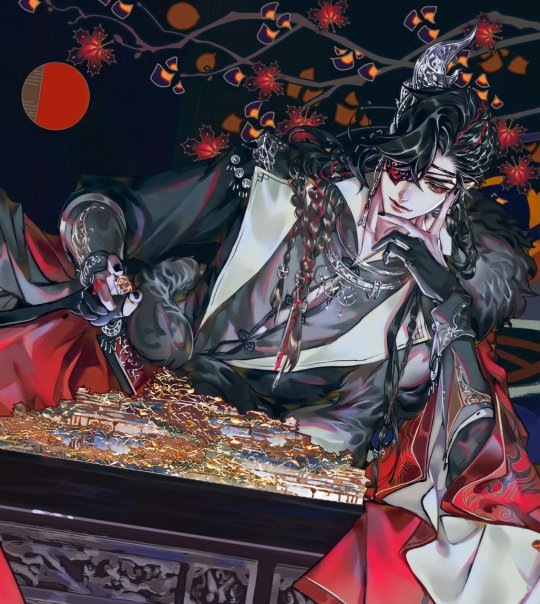


Yes the second one is a meme hush I download every picture I like.
And these are some official necklaces for the Miao nationality:

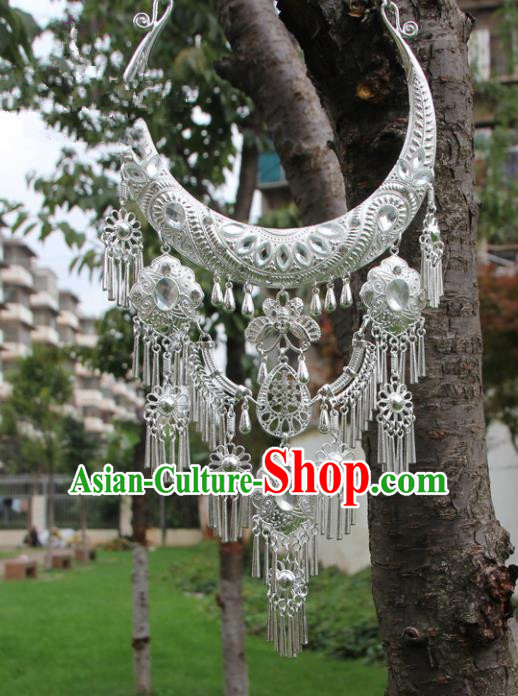
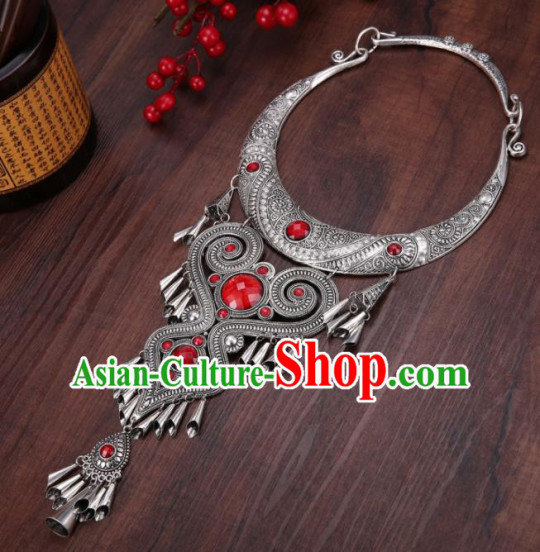
It's just gorgeous. And as I looked up more pictures, the women specifically really love to deck themselves in jingling jewelry (can anyone blame them, really?) and it's so beautiful.
And then we also know Hua Cheng has silver vambraces. Well I found a silver bracelet on the website too, again, from the Miao nationality:

I'm just. Obsessed. The details. The beauty.
Man I love that by reading about these characters, I learn so much about other cultures. I get to actually understand their characters more. But I learn. As these are actual real people that the author (MXTX in this case specifically) took inspiration from. Then the artists who drew the arts also did their research about it and drew jewelry according to their culture.
I'm really loving all this.
Is this something mind-blowing in general? Probably not. But I like learning new things, I find cultures just interesting as they are. And learning about them and being able to connect my favorite characters to them makes the learning so much more fun.
Btw all of these are available on the Asian Culture Shop website, you can buy them, but they're expensive. Even so I recommend you go there and just look at all the different clothings, they're all so gorgeous.
5 notes
·
View notes
Text
while i'm on the topic of the villages being based on different countries, konoha being based on japan and china is so fun – especially when you think of the different influences for each clan.
i love the idea of the uchiha being similar to the ainu people of japan. they're one of the first two clans in konoha, which goes well with the idea of them being indigenous, and it also allows you to mess with the idea of them being the most traditional because of their native identity.
along with that, there's the idea of tenten (someone who has more chinese influence in her outfit than other characters) being from a more chinese indigenous inspired family whose a sub-ethnic group of the miao, maybe like the hmong people?
or the hyūga being most similar to ethnonational japanese people and having the most unfiltered japanese influence, or even being inspired by the first japanese group, the yayoi people.
anyways, people should open their minds to the hidden villages being inspired by more countries than just japan.
#naruto#naruto headcanons#sorry this is kinda jumbled im just getting some thoughts out#konoha#konohagakure#uchiha clan#hyuga clan#aloeverants
21 notes
·
View notes
Text
Unveiling the Charm: Exploring the Rich Tapestry of Fashion Bracelets in China
In the kaleidoscope of Chinese culture, fashion bracelets emerge as not just accessories but intricate symbols of tradition, spirituality, and personal style. From ancient origins to modern trends, let's delve into the captivating world of fashion bracelets in China.
Heritage and Tradition:
Fashion bracelets in China boast a rich heritage dating back centuries. Traditional Chinese bracelets often feature auspicious symbols such as dragons, phoenixes, and longevity characters, believed to bring luck, protection, and prosperity to the wearer. Crafted from materials like jade, gold, and precious stones, these bracelets serve as heirlooms passed down through generations, embodying familial ties and cultural identity.
Spiritual Significance:
Beyond their ornamental value, fashion bracelets in China hold profound spiritual significance. Buddhist prayer beads, known as "Buddhist Bracelets," are revered for their role in meditation and mindfulness practices. Each bead represents a mantra or prayer, guiding practitioners on their spiritual journey and fostering inner peace and harmony.
Modern Elegance:
In contemporary China, fashion bracelets have evolved to reflect changing tastes and trends. From sleek minimalist designs to bold statement pieces, Chinese designers infuse traditional elements with modern aesthetics, creating bracelets that resonate with global audiences. Materials such as silver, stainless steel, and leather are favored for their versatility and accessibility, catering to a diverse range of preferences and lifestyles.
Cultural Fusion:
The landscape of Chinese fashion bracelets is a melting pot of influences, blending ancient traditions with contemporary flair. Inspired by regional folklore, ethnic minorities, and global fashion trends, Chinese bracelets embody a fusion of cultures and perspectives. From the intricate knotting techniques of Tibetan bracelets to the vibrant colors of Miao embroidery, each design tells a unique story of heritage and creativity.
Personal Expression:
In the tapestry of Chinese society, fashion bracelets serve as expressions of individuality and identity. Whether worn as talismans of protection, symbols of status, or simply as fashionable accessories, bracelets allow wearers to convey their personality and values to the world. From celebrities gracing red carpets to everyday fashionistas on bustling streets, Chinese bracelets transcend boundaries, uniting people in their shared love for style and self-expression.
Fashion bracelets in China are more than just adornments—they're living artifacts of a rich cultural legacy, imbued with meaning, symbolism, and personal significance. As they continue to evolve and adapt to the rhythms of modern life, these timeless treasures remain steadfast reminders of the enduring beauty and complexity of Chinese fashion and culture.
0 notes
Text
Hao Miao’s Intro…
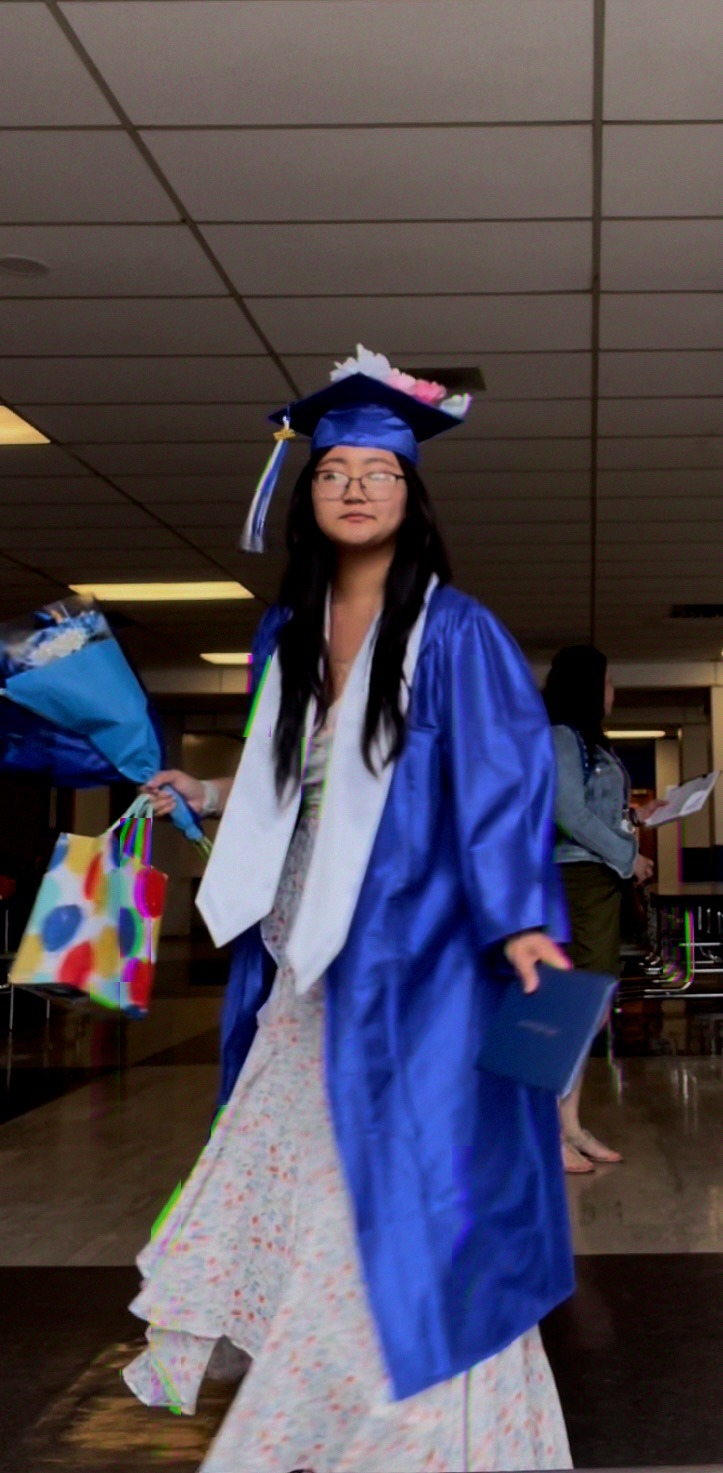
Hi, I’m Hao Miao and I’m a current BArch student right out of high school last year. I have always loved to build and design for as long as I can remember. This externship will help me become more inspired and experienced in my future works that thrive to help people bring out their creativity.
0 notes
Text
ok after looking at last night's replies again i have some thoughts.
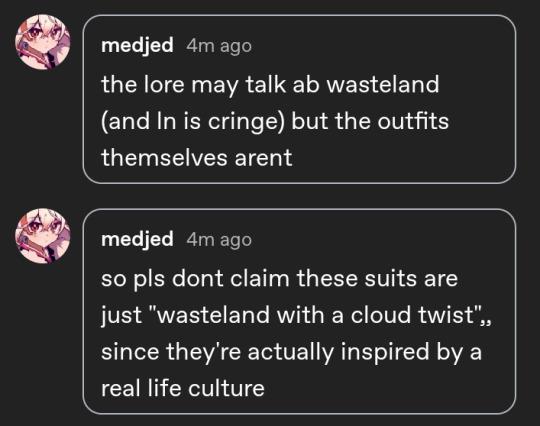
1. "so please don't claim these suits are just wasteland with a cloud twist since they're actually inspired by a real life culture."
republic of wasteland is also based on real life cultures. yes they're blurred together and treated like a monolith, but that doesn't mean they should be dismissed as fake. miao people aren't the only real culture in this game, clearly. it's very gross to imply that wasteland is fake cultures when the reason brown and black poc hate it so much is because they're garbage representations of real cultures.
2. "the lore may talk about wasteland and ln is cringe, but the outfits themselves aren't."
the lore doesn't just briefly mention wasteland, it's heavily focused on wasteland. the father is from wasteland. he was inspired by the cloud cultures. he married a cloud woman who birthed and raised the twins in wasteland. the twins blend both wasteland and cloud in their work. one of sunset glow's items mentions her wanting to go to cloud empire. it's not farfetched to visualize these suits as a blend of both wasteland and cloud. i said it's wasteland with a cloud theme due to them being born and raised with wasteland culture and having never visited cloud empire.
paper games clearly meant for these suits to encompass both wasteland and cloud themes. yes it's based on miao people, i'm aware now, but that doesn't cancel out that it's also based on paper games' shitty representation of indigenous cultures. they can co-exist. if paper games intended them to be only seen as cloud empire miao suits then wasteland wouldn't be mentioned at all, let alone be the focus of the descriptions.

it doesn't even seem like op is miao or even consulted a miao person so if an actual miao person wants to chime in please do.
0 notes
Text
Sun Wukong and Hanuman
This is my answer to the following Quora question:
Who is Sun Wukong? Is he a Taoist version of Hanuman or the reverse, Hanuman is a Buddhist version of Sun Wukong?
It is important to begin by saying that Sun Wukong has been associated with Buddhism since his earliest known appearance, that being an 11th-century mural from the Eastern Thousand Buddha cave grotto complex in Gansu province, China, near the end of the silk road. He represents the “monkey of the mind” (xinyuan, 心猿), the disquieted thoughts and emotions that bar humanity from enlightenment. His association with Daoism came later.
Hanuman is of course a Hindu god who appears in Valmiki’s Ramayana (c. 5th to 4th-century BCE), which predates the final Ming dynasty edition of the Chinese classic Journey to the West (Xiyouji, 西遊記, 1592) by nearly 2,000 years. Various retellings of the Ramayana appear in Buddhist scriptures that came to China (see here), but it’s clear that Hanuman played a very minor role in the religion. For example, Tibetan folklore states the six tribes of man were the offspring of a magic monkey, the avatar of the Avalokitesvara Bodhisattva, and a stone ogress, an avatar of the Tara Bodhisattva (this myth appears in Tibetan Buddhist writings as old as the 12th to 13th-century). Some scholars suggest this monkey, sometimes called “Hilumandju” or “Ha-lu ma-da”, was inspired by Hanuman (see the bottom of this article).
Many people believe Sun Wukong is a direct carbon copy of Hanuman. The evidence doesn’t support this, however. Given the fragmentary nature of the Ramayana in Buddhist records, the influence, if any, was likely indirect. In my opinion, the greatest single influence on Sun Wukong’s characterization from the Ming Journey to the West is actually a magic white ape from Chinese literature. Appearing in “A Supplement to Jiang Zong’s Biography of a White Ape” (Bu Jiang Zong Baiyuan Zhuan, 補江總白猿傳, c. late 7th-century), this unnamed primate antagonist(!) is depicted as a Daoist priest who uses his magic to kidnap a general’s wife in order to add her to his harem. He shares a number of surprising traits with the Monkey King:
A supernatural primate capable of human speech.
A one thousand-year-old practitioner of longevity arts.
A master of Daoist magic with the ability to fly and change his appearance.
A warrior capable of single-handedly defeating an army.
Has an iron-hard, nigh-invulnerable body immune to most efforts to harm him.
Has eyes that flash like lightning.
Lives in a verdant mountain paradise like Flower Fruit Mountain.
His dwelling is a stone chamber like the Water Curtain Cave.
The White Ape’s association with Daoism likely influenced Sun’s portrayal as a practitioner of the Daoist arts. This was added to Monkey’s already lengthy association with Buddhism.
Interestingly, a 15th-century Zaju play that predates the Ming Journey to the West by nearly 200 years depicts Sun Wukong having a wife whom he had kidnapped from a neighboring country (see here). This is an obvious nod to the white ape and related stories. These magic primates appear in a body of Han (206 BCE-220 CE) and Tang (618–907 CE) dynasty tales in which they kidnap human women to father their children. One such tale recorded in the third-century is quite interesting because it claims the ape has fathered most of the people, surnamed Yang (楊), in “southwestern Shu”, an area corresponding to modern Sichuan, which is home to many Tibetans and related ethnic groups. Said groups, including the Qiang, Miao, Yao, and others, hold the belief that their respective peoples were fathered by a primate (heaven-sent or otherwise) (again see the bottom of this article).
This should remind readers of the magic monkey from the Tibetan origin myth mentioned above. Admittedly, the oldest known pictorial depiction of the monkey-stone ogress myth appears in a 7th-century mural from Jokhang Temple. But the similarities between the magic ape myths of the Han and the primate progenitor myths of Sichuan and Tibet point to a wider myth complex, suggesting the material that influenced the white ape that in turn influenced Sun Wukong could have ties to Tibetan peoples. And since Hanuman may have influenced the Tibetan monkey Hilumandju/Ha-lu ma-da, he could have also influenced the primate progenitors of said myth complex.
#Hanuman#Sun Wukong#Monkey King#Lego Monkie Kid#Son Goku#Goku#Tibetan#monkey god#JTTW#Journey to the West#Xiyouji#Saiyuki#China#India#Tibetan myth#monkey ancestor
56 notes
·
View notes
Text
On Chinese and Eastern Dramatic Acting vs Western
Part 1 Part 2
Mostly in ref to the Untamed/Word of Honor, but applies to a lot of East Asian works-
I’ve been getting the sense that people I know from the west (also being Asian-American myself) often interpret Chinese/Japanese/Korean drama and theatre to be too corny/cheesy/over-acted. A quick search on some internet forums confirms this. Maybe it’s because I used to watch a lot of C-dramas when I was a kid (Legend of the Condor Heroes/Return of C Heroes/Journey to the West/The Reincarnated Princess/etc), I personally did not notice that the acting was over the top.
I don’t really speak for the quality of acting of these actors because I barely follow them in their careers, but I do know that some of them are immature actors or don’t have much formal training (which may cause the cheesiness above). However, Eastern dramatic acting in general does seem like a common complaint, so I decided to look into it - this is all coming from someone who JUST recently got back into watching C-dramas btw, doing my own research so don’t mind me if there’s some incorrect things down here, I am by NO means at all an expert in drama and theater (lol):
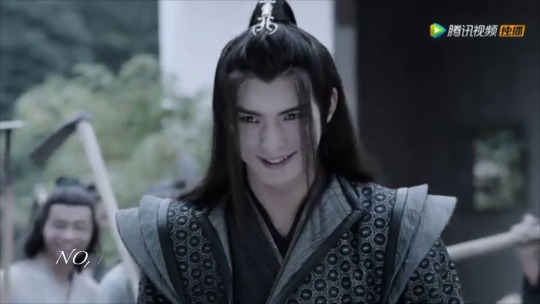
^Villains are often depicted with very exaggerated facial expressions (Above, Xue Yang, The Untamed)
Part 1
1. Chinese concept of mo vs western equivalent of “mimesis” or “imitation”
From this, an excellent chapter on Chinese theatrical concepts vs Western concepts.
Mo plays a significant part in traditional Chinese theatre, usually held to be antithetical to the realism of Western theatre because of its emphasis on theatricality.
Mo means mimesis or imitation, but in a very different sense from the Western concept. One of the first Chinese scholars to use this term, Fu Sinian, used it to compare Western theatre to Chinese theatre:
Presenting a real event and performing an entertaining show are not compatible. The former emphasizes imitation (yige zhong mofang^b); the latter stresses spontaneity and entertainment. The former performance produces a lifelike image; the latter has nothing to produce. The former puts emphasis on the plot; the latter puts emphasis on theatricality. Therefore they are completely contradictory to one another.
This guy actually goes onto critique Chinese theater, saying it should be more like Western realism, so that there will “be no singing, and the acting will imitate people’s real gestures.” However! Other Chinese critics tried to approach Western vs traditional Chinese drama as two DIFFERENT but still valid forms of art. For example, Yu Shangyuan (1927) said western performance is “writing realistically” (xie shi) and chinese performance as “writing suggestively” (xie yi). Western dramas really rely on an accurate/semi-accurate representation of life and realism. Traditional Chinese drama and acting relied on the “symbolic and imaginative.”
Then what is mo? It is the emotional display, the emotional revelation, that is shown on stage. Starting from the Yuan dynasty, the Chinese drama was thought to be a continuation of poetry rather than its own independent stage art.
Poetry is where the intent of the heart goes. Lying in the heart, it is “intent”; when uttered in words, it is “poetry.” When an emotion stirs inside, one expresses it in words; finding this inadequate, one sighs over it; not content with this, one sings it in poetry; still not satisfied, one unconsciously dances with one’s hands and feet. [anonymous, 1975, from Shi Daxu 200 BCE]
Chinese drama with dancing and singing, was the most expressive product of poetry. The importance of mo cannot be stressed enough - it is the measure by which traditional Chinese drama was judged, how well this drama make you feel? Love, pain, loss, guilt, happiness? Plot becomes something that doesn’t matter as much (more on that later).
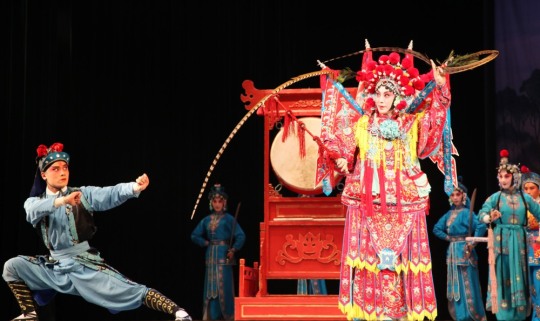
^Beijing/Peking Opera - highly stylized, emotive, “unrealistic” performances
To emphasize how central and important this concept is, it’s thought that a good Chinese playwright never fails to “seize a highly dramatic scene to stage an elaborate presentation of an emotional state.”
Love is of source unknown, yet it grows ever deeper. The living may die of it, by its power the dead live again. [Peony Pavilion, Mu dan ting]
This quote really shows how important it was to show these emotions on stage, to inspire the audience to feel deeply. Chinese critics believed that the best part about drama was how efficient it is to display emotion. Playwrights should “depict extreme bitterness, extreme happiness, extreme silliness, and extreme sobriety; imitate these feelings to the utmost (miao mo jin xing^p).”
Such performances are not necessarily accurately mimicking reality, but they are obtained through the “revelation” of a character’s internal emotional world.
2. Mo vs the depiction of reality or theatrical truth
The Chinese concept of aesthetic truth relates a lot to theatrical truth. In a lot of traditional Chinese art, painting, poetry, etc, aesthetic truth is not empirical, and doesn’t have to be accurate to life, or realistic. It’s a “truth that lies beyond mere superficial likeness.”
To the Chinese artist, an accurate resemblance between art and reality is not only superficial but often distorting. Chinese artists hold a dialectical view on the “form” (xing) and the “spirit” or “content” (shen) of an artistic object. According to them, xing and shen are not always complementary. On the contrary, they often stand in opposition to one another. (referenced in the chapter above)
Traditional Chinese artists would rather represent the object with the wish that their representation matches its spirit, or abstract identity, than its actual form because a “photographic image is a shallow image.” It’s easy to draw a picture of something realistically, but it’s much harder and more satisfying to depict its nature, its feeling, its spirit.
This also naturally affects theater and dramatic performances.
Dramatic writing can be divided into two types: “a painting-like work” or a “transformed work,” in which the latter has higher artistic value because it reaches more towards the essence of dramatic object. Realistic imitations are fine, but they’re not really enough to reveal the mo or true feelings of something.
In addition, traditional Chinese dramatists believe that “all dramas are nothing but allegories. One need not ask about their origins in actual life.” You might be able to see, then, that these older playwrights and critics really fancied the overdramatic depictions of emotions.
a. The Chinese notion of theatrical truth/aesthetic truth vs European
Onto what we, as part of the Western audience, are more used to:
For Italian neoclassical critics, the pleasure of a drama hinges on how accurate, how realistic, the depiction is. Castelvetro, the leading Italian Neo-Classical critic and creator of the concept of “the three unities,” claims thus:
We cannot imagine a king who did not exist, nor attribute any action to him.
Another Italian critic, Robortellus, said that a creative/imaginative story with no “verisimilitude” (truthfulness, in this context, realism) is less appealing than one that imitates a real-life event:
Thus if a tragic plot contained an action which did not really take place and was not true, but was represented by the poet himself in accordance with verisimiltude, it would perhaps move the souls of the auditors, but certainly less.
So basically, it’s fundamentally the opposite of Chinese theater. Italian dramatic works prized being realistic, being properly adapted from reality and real events. Chinese dramatic works, however, enjoyed the emphasis on heartfelt emotional demonstrations, or mo. Even in critical writings, the word “truth” is used, but it is usually used to modify the word “heart” or “emotion.” It is very concerned with the internal, the truthfulness of heartfelt emotional expression.
Taken these contexts, you can see why the Chinese stage/dramas are wholly “unreal” as Tao-Ching Hsu puts it. Everything, the makeup, the costumes, the props, is expressive and suggestive rather than imitative.
b. Bejing/Peking Opera, jingju
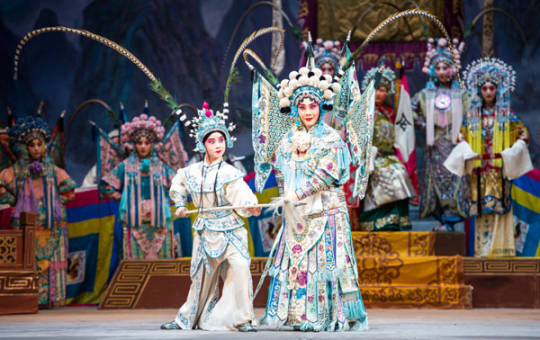
A famous example is the Beijing/Peking Opera, jingju. The makeup and costumes themselves are fantastical representations. The colors and patterns suggest different moods, temperaments, characters, and even changes in emotions. Actors would make distinct movements to depict distinct emotions with varying levels of energy. The stage itself may be sparse, because it is not as important as the expression of emotion and drama.
The stage is sparse not because of the lack of technology or funding, but because it leaves room for the actor themselves to fully express their internal thinking/feeling/emotions. Characters can cross hundreds of miles in a few steps or may take the whole stage to cross a supposed road. This representation looks “unreal” to a realistic-minded audience, but it is very genuine to a Chinese audience.
Summary (so far)
This crucial understanding of the concept of mo (the emotional revelation), and the way traditional Chinese drama depicts life and stories, informs how their modern works are also portrayed. Coming from a Western dramatic background, where realism and plot are the most important aspects of a work, it can be very confusing, right? Even Chinese scholars began to judge their own dramatic works through a Western lens.
How does this traditional background affect modern Chinese dramas and works? I think it still has a very large effect, even though much of Western ideals about dramatic works have been heavily integrated into modern Chinese dramas.
Part 2: On Theatricality and how it transfers into Chinese Cinema
#cdramas#theater#acting style#beijing opera#the untamed#word of honor#kdramas#jdramas#theatricality#east asian cinema
122 notes
·
View notes
Text
Fic: these are a few of my favourite things
Fandom: Word of Honor
Pairing: WenZhou
A/N: Many thanks to @xiefatasslian and their brilliant post that inspired this, and for graciously giving me the permission to take a stab at this. I hope you all will enjoy this haha...
—
From their table, Gao Chong spies the way Ruyu’s boy is leaning into their Zishu’s space, smiling serenely as his lips shape around words that they cannot hear. But there is no mistaking that smile and there’s no missing the interest in his eyes and Zishu doesn’t look displeased to be this close to him.
‘He grew up well,’ Gao Chong finds the thought trickling through his consciousness. He hasn’t seen Ah Xing in a couple years but wasn’t he working with his dad now at the pharmacy? That’s a good solid profession. Carrying on the family business, that’s a good thing.
He remembers someone saying that Ah Xing came out to his parents just after he graduated high school and even brought the boy he was seeing back to see them. Ruyu and Miao Miao must be alright with their kid’s sexuality because last he heard, Ruyu was planning on letting Ah Xing handle more of the business while he and his wife go off on vacations.
Gao Chong takes his time looking at Zishu and Ah Xing.
They look well-matched next to each other. For all that Zishu was always this serious child growing up, all that seems to unravel as he has his eyes fixed on Ah Xing. Something twinges in Gao Chong’s chest and he huffs, realising that it is happiness at the sight of Zishu actually smiling.
When Zishu had came out to them, the kid had been pale and tensed. Coiled tightly like he was about to face off against some Goliath and not his father’s best friends who had practically helped raise him as well. Instead of the rejection he had been expecting, Gao Chong had made sure that Zishu never had to worry about their support in terms of what he chose to do in life or who he chose to love.
Granted, neither one of the uncles are about to start waving a rainbow flag or start dousing themselves in glitter, but they try to keep communications between them and Zishu as open as possible so that the child always knows he can count on them to have his back.
Nudging Zhao Jing in the ribs, he grabs his arm jerking his head at where Zishu was now visibly blushing in the light by the ridiculous ice swan sculpture. “Ruyu’s kid. You know if he’s seeing anyone?”
Zhao Jing narrows his eyes at him before squinting at the way those two of the younger generation are clearly having a conversation. “Ah Xing? Not that we’ve heard.”
Gao Chong harrumphs, leaning back in his chair to survey the way Zishu and Ah Xing have begun to engage in a little back and forth with the wine glasses. Was this a new game that young people are playing these days?
The more he looks at them, the more the decision cements itself in him. Slapping his thighs, he looks over at Zhao Jing and Shen Shen in turn, grinning. “Let’s get down to business. See there? See how Ruyu’s kid is getting our Zishu to smile?”
Three sets of eyes turn to where Ah Xing was doing a lot more than making Zishu smile if the clear blush on his face is anything measure by.
“Ge...”
“Shush,” Gao Chong says with no small amount glee that only comes with the shamelessness of age. “I have a plan.”
“A... Plan?” Shen Shen asks cautiously.
“Yes,” He laughs, throwing his arms around his brothers and shaking them. “We’re going to matchmake them!”
Everything unfolds beautifully in his mind. It’s going to be amazing and he cannot think of anything more perfect that setting up Zishu and Ah Xing. This is foolproof and Gao Chong gives himself a mental pat on the back for this brilliance.
.
.
.
.
.
The moment he is able to curl his phone screen away from the eyes of his brothers, Shen Shen pulls up the group chat he has pinned to the top.
‘Heads up. Your Uncle Gao is planning on setting you two up,’ He types out quickly.
Zishu replies with a simple, ‘?’
‘You and Ah Xing. He is planning on hooking the two of you up’
Ah Xing quickly shoots a quick series of text bubbles, ‘And you. Didn’t think? To tell him? That we’ve been together since he was 17??’
Shen Shen scoffs, dodging the look from Zhao Jing and quickly takes a deep drink of his beer. His phone continues to buzz on his lap but he ignores it. He’s staying well the hell out of this.
#word of honor#wenzhou#gab writes stuff#if this reads a bit wilding it's coz i've been writing this while live-blogging the concert to deal with my emotions
90 notes
·
View notes
Text
Welcome to the Nightmare Game - CH92
**This is an edited machine translation. For more information, please [click here]**
[<<< Previous Chapter | Table of Contents | Next Chapter >>>]
-----
Chapter 92: Castle Cry (XIX)
{cw: discussion of miscarriage, suicide, gore}
Qi Leren hesitated and guessed who Su He was talking about. He had also doubted this person, but he still regarded him as a "witness" rather than a puppet master behind the scenes: "The doctor?"
Dr. Lu gave a cry: "You called me?"
"...I mean Dr. Flajser," Qi Leren said quietly.
Dr. Lu scratched his head: "Oh, when I was in the hospital, I was called for as ‘doctor’ every day. I was more habituated to hearing this title than to hear my name."
Su He smiled to show his understanding, and said: "The game’s copy tasks are very logical - in contrast, the tasks in the Nightmare World sometime seem out there, probably because the Nightmare World is relatively real and sometimes reality is illogical. However, in the copy world, 'illogical' situations rarely happen. The game may give you a useless clue to confuse you, but there will never be such a thing as the puppet master being an NPC that has never been mentioned."
Dr. Lu hesitated: "I have a little understanding of your meaning. You mean that the copy world tasks are like novels, movies, or games. They’re logical, just like how a culprit in a mystery novel must be a figure who has appeared before. It’s impossible to reveal that the prisoner is a pair of twins at the last minute without paving the way for it, because this violates the logic of a story."
"Yes, at present, the copy task should be coming to an end, and the plot is beginning to finish, so no new characters should be added. We can analyze the characters who have appeared at present: four plot NPCs, two players, the crazy lady Sarah, the male host John, the maid Nina, Doctor Flajser, the late Adeline, and perhaps the devil's will. The plot of the simple ending should be that the crazy lady lost her mind and killed all the people in the castle. As long as you killed the crazy lady in the castle, it could be over, but we are now on the route of the true ending, so we must solve the ghosts in the outer world. The crazy lady is also solved, and the truth of the year has been investigated as much as possible. The plot will be much more complicated, and many things may not be as we’ve seen."
Su He said easily, "Nina's problems need to be further investigated by her later. Let's talk about Dr. Flajser first. From Johann's correspondence with him asking him to come to the castle to treat the crazy lady—and more than once—it can be seen that he was also in China at that time. Considering that many foreign doctors did come to provide medical services to their employers at that time, this fact that he came to China cannot be used as evidence to question him, but it can be used as evidence that he has the conditions to commit crimes. The key point is that the letter also mentioned contraceptives. What are the ingredients of this medicine? Is the wife's miscarriage related to him?
"We can reverse it. First assume that Dr. Flajser is the murderer who let the crazy lady miscarry and go crazy, and whether he had any way to do it. Yes, he is a doctor, and he is familiar with and trusted by the couple. He has the conditions and ability to do such things, especially to drive the crazy lady mad. He should be aware of this genetic psychosis in her family, and that it’s only a matter of time before she goes crazy with a little hallucinogens. For motive, does he have a motive? I think he does."
Qi Leren listened attentively to Su He's analysis and kept up with his thinking: "Is it because of Adeline?"
Su He nodded and looked at Qi Leren appreciatively. "Yes, do you remember the paragraph in Johann's diary about him and Sarah sweeping Adeline's grave? He said they met Dr. Flajser on the way back from the cemetery visit. This clue was given for a reason. Dr. Flajser was probably going to sweep Adeline's grave."
"Hey, it seems that Dr. Flajser had a good relationship with Adeline. Did he know that Adeline's death was odd? Then why didn't he sue the crazy lady?" Dr. Lu asked.
Qi Leren said, "Don't forget Mrs. Sarah's identity. Her family should be powerful aristocrats."
"Oh oh, that makes sense. Mrs. Sarah murdered Adeline, and Dr. Flajser, who was closely with Adeline, saw that it was wrong but he couldn't get Mrs. Sarah to be brought to justice, so he decided to kill her and make a revenge drama," Dr. Lu snorted.
"But this is completely speculative, and there is no substantial evidence. Maybe we will find negative evidence in the future." Su He smiled. "If we change our thinking, maybe Nina is behind poisoning the crazy lady, or maybe Johann is the real murderer. Who knows?"
There were too many possibilities. From another angle, maybe the truth is that Johann and Nina had hooked up. Johann was greedy for his wife's wealth, and got all kinds of medicines from Dr. Flajser, which made Mrs. Sarah crazy and made people think that her genetic disease had broken out. Then he waited for an opportunity for her to "accidentally die" in order to get her inheritance.
What role did Nina play in it? Was it that although she had hooked up with the male host, she still sympathized with the crazy lady? Or did she secretly let the crazy lady go just to further stimulate her and even kill her?
"It's 4:43 now. We have to go to Nina quickly, otherwise we’ll enter the other world," Su He looked at the time and said.
On the way to the first floor, there was silence all around, and the creaking of shoes on the floor and the incessant thunderstorm outside the window made people uneasy. Qi Leren thought this kind of castle building was too dark, and people who stayed here for a long time would be prone to mental problems and become suspicious of everything.
"Just ahead." Once again entering the corridor on the first floor, Qi Leren pointed to the room in front and spoke.
Miao Bo's body wasn’t present in this world. This old room smelled unpleasantly musty. The wall near the window and the ground nearby had rotted to the core. The small door locked from the outside in the inner world was still in the same position, and it looked inconspicuous.
"It's this lock. After you engage it, you can't open the door from the inside. Obviously, this lock was added later." Inspired by Su He, Qi Leren pointed to the door lock and spoke.
"But you don't need a key," Su He said.
"Then I can open the door?" Qi Leren suggested.
Dr. Lu went hide behind Su He and said with great righteousness: "You can do it."
Qi Leren looked at him contemptuously, took Dr. Lu's flashlight, opened the outer lock, and then turned the door handle - the dusty wooden door was pushed open, a strange smell invaded their noses, and the flashlight shone in the dark room. On the wall facing the door, there was a corpse hanging under a mounted goat’s head!
“!!!” Qi Leren took a step back and looked at the hanged body nervously. After a long time, the body had turned into a skeleton and, dressed in a maid's clothes, her identity could be clearly seen.
Qi Leren immediately understood who she was.
But why was Nina hanging here?
Su He also walked into the room. His eyes stayed at Nina's feet, and his voice said coldly: "She didn't commit suicide, she was hanged here."
"Huh?" Dr. Lu also came in and snorted strangely.
Su He pointed to the tea table at the feet of the skeleton with his cane - Qi Leren remembered that he had picked up this tea table in the inner world to deal with the armor that broke the door - and the tea table was placed a few meters away from the feet of the skeleton. It did not seem to have been kicked away by the hanged woman at all, but seemed to be neatly placed away from her feet.
Qi Leren frowned and looked at the skeleton. The room was also filled with demonic power, and the smell of smoke made the seed in his body stir.
"There should be another devil sacrifice here," Qi Leren said with certainty.
"Indeed, look at the wall." Su He pointed to the wall.
Qi Leren looked down in the direction he pointed out, and there were some traces on the mottled wall... He stepped forward and scratched the wall with his fingers, and the moldy wallpaper peeled off like an egg shell. Some strange totems were faintly visible on several clean walls nearby…
[Obtained the Devil's Sacrifice 5/6]
"Is there no iron box this time?" Qi Leren looked around and asked softly.
"I'm afraid this room is an 'iron box', and the sacrifice is probably Miss Nina." Su He sighed.
"The phantom is coming, switch to theatre mode." Dr. Lu snorted, waiting for the show to start.
Sure enough, with the discovery of the devil sacrifice, the phantom appeared again.
"Are you afraid, dear?" the crazy lady asked softly.
Her phantom appeared in the middle of the room. Her face was blurred, but it could be seen clearly that one of her eyes had been gouged out and was still bleeding.
Nina, standing under the goat’s head, held a hanging rope in her hands, stepped on the tea table, then sobbed and shook her head. She tried her best to suppress her crying, but she couldn't hide her deep fear when she faced death.
"Didn't you say you would do anything for me? Why are you afraid?" The crazy lady stood in front of her, looked up at Nina, who was frightened and helpless, and giggled.
"I, I am willing to help you escape... I... but I..." Nina couldn't help crying. "I don't want to die, madam, I don't want to die!"
The crazy lady's facial expression changed and she stared at her fiercely. Nina's crying came to an abrupt end, and she dared not speak out, shaking and holding the rope with her hands.
"Good child." The crazy lady held out her bloody hand and stroked her cheek. "Yes, just put your head in. I just need a little help, and you’re willing to help me. You’re a good child..."
Nina's face was covered with blood. She looked at the crazy lady in fear, trembling and sobbing, but she stuck her head into the rope’s loop under the crazy lady’s guidance.
A twisted smile appeared on the crazy lady’s bloody face, and she suddenly leaned down and took away the tea table under her feet!
Nina's body fell, and the noose around her neck tightened immediately. She struggled painfully, kicking the wall and scratching the rope around her neck, but it was useless. The pain of suffocation made her eyes pop out, and they bulged. The sounds of crying and choking overflowed from her throat as if they could expire at any time.
The crazy lady looked at her struggling with the tea table, looking cold and cruel, without guilt or fear. She watched quietly until Nina gradually stopped moving and was hanged in front of her eyes.
The crazy lady took a step back, admiring the goat head in her head, and let out a sigh of relief. She put the tea table back in place, singing and pushing her finger into her empty eye socket. The stirring noises of the sour viscous liquid sounded, and she dug a pool of fresh blood from the eye socket and painted on the wall.
Her tone was so strange that the original lyrics became creepy: "Will you love me? I love you. Even if you change your mind, it doesn't matter. I have prayed to the Devil to let us be together forever. My love bird, don't try to escape me, dear Johann, you will love me as one."
-----
[<<< Previous Chapter | Table of Contents | Next Chapter >>>]
30 notes
·
View notes
Text
We Were Smart - factory districts & underground youth culture in China
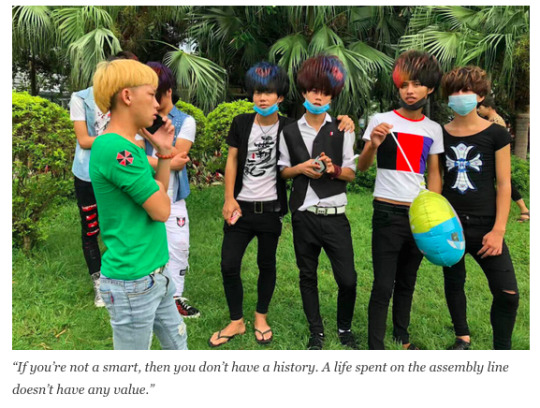
youtube
Smart, Disaffected & Unseen: Li Yifan on the Rise & Fall of a Proletarian Subculture by chuang | Sep 22, 2021
Below is our translation of an interview with Li Yifan about his documentary film We Were Smart (杀马特我爱你), along with a new preface by our friend BG about the film’s significance for China’s emerging movement of “autonomous spaces.” The Chinese interview, conducted by Zhao Jingyi (赵景宜) of NoonStory (正午), was originally published on Jiemian News (界面新闻) in November 2020 as “Li Yifan: The Pressures Facing ‘Smart’ Workers Are Extremely Similar to Those Facing Urban White-Collar Workers” (李一凡:杀马特工人和城市白领,两者的压抑非常类���). BG’s preface has not been published elsewhere. The film is currently available to view online with English subtitles here
NS: You commissioned 915 short videos, and selected some to put into your documentary. What was it that moved you about these self-filmed videos from ordinary workers?
LYF: The videos I collected can be separated into three types. Most of them are videos of workstations, or the assembly line. The second type records life inside the factory. The third records everyday life for jobseekers in factory districts. The videos come from Shipai, Dongguan, Shenzhen, and other areas with large concentrations of factories.
No single video from the workstation collection made a very deep impression on me, but after watching them all, they collectively left a very sharp impression: The work environment, the intensity of the work, the hours––all of these were beyond what I had imagined. I knew people were working overtime, but I didn’t know they worked for that long. A lot of work environments are pretty bad, and the workers look so young.
Some of the workers recorded conditions in larger factories. This is really quite hard to do, because taking out your phone can get you fined. In one of the videos, the shift manager is leading the workers in saying “Hello, how are you doing, I’m doing very well.” From the video, you can see the position that workers are put into, being cursed or scolded. In another, two kids are unemployed, so they go to apply for jobs, and the video they shot captures the whole job application process, including a blood test. For job applications, they check your hands, they check your body, just like at a slave market, they look to see if you can move your joints. These two videos left a deep impression on me.
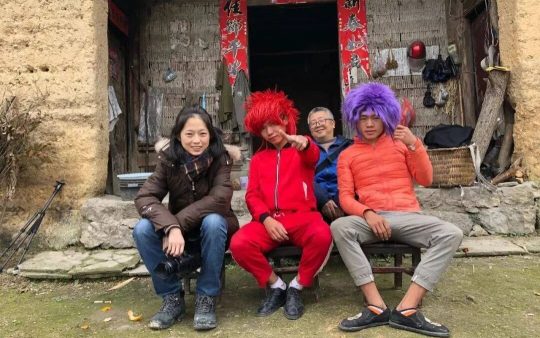
Another excerpt from the interview translation posted at Chuang (the images above are also from the interview).
LYF: There’s still some pretty good public space in Shipai: there are two skating rinks, and Shipai Park. I think the design of the park is especially good––it’s not elitist, it feels like it won’t turn anyone away, that kind of feeling. The park seems like a place where anyone can find a place to sit down and have fun. The park is also close to the factories, and smarts can come to show off and get away from life on the assembly line. Once in 2018 I was in Shipai Park and the whole scene was magnificent––it was a long weekend, and workers didn’t have anything to do. Tens of thousands of youth were walking around the park, circulating. They were all normal workers, who make the least amount of money, the lowest level. A lot of them were members of southern ethnic minority groups. The smarts were there too, a very small part of the group. You could see that there were Miao people singing, Zhuang people singing duige (对歌), and people wrestling, very formally, in ethnic wrestling traditions. A lot of people were sitting on the ground, meeting up with people from the same hometown, chatting, and playing on their phones.
NS: The protagonist of We Were Smart, Luo Fuxing, provided a lot of help when shooting the documentary. For example, he thought up the slogans for recruiting smarts to help out with the film: “No deposit needed” and “A daily income of 1,000 yuan is within your grasp.” After being in contact with him for such a long time, in what ways has he inspired you? LYF: I later realized, workers’ logic and our logic are not the same. When Luo Fuxing said “no deposit needed,” that was because many people have been scammed online, with the scam beginning from a deposit. Many kids have been scammed by pyramid schemes. Actually, it’s not because they want to earn money, but because girls tricked them into joining. One girl said: “If you join, I will marry you.” They joined, and then they couldn’t get out until they had been scammed out of all their money. In the process of collaborating, I was often in conflict with Luo Fuxing. Sometimes I would be talking with Wu Ya, the director of photography, about coffee or something that had happened internationally, and Luo Fuxing would get very angry and the next day he wouldn’t go to work. He believed he had been overlooked; he thought we were just trying to show off. I also slowly learned how to change my method of talking with workers, understanding their way of thinking. For example, a journalist once came to interview the smarts, but they wanted to be paid. The journalist said that this would violate journalistic ethics. My view is, your ethics might be right, but these ethics of yours take up other people’s time. Workers at the factory measure their time in terms of money: the factory has determined that one hour is worth 20 yuan.
The factory districts are never that different from each other, no matter if they are in Guangdong, Fujian, Zhejiang, or Sichuan. Factory districts consist entirely of enclaves for people from outside the city––they’re more like the countryside.
1 note
·
View note
Text
Getting Bai Yi’s approval
I wasn’t intending to write Dong Hua salt, since I figured he already suffered for pet neglect when he searched for her for years in vain, and technically Feng Jiu wasn’t thinking of the repercussions if it became known how the princess of Qingqiu lowered herself to get close to Dong Hua... this was inspired by my anger over Suoying’s bullying. I hate that the snow lion can get away with it.
When Bai Yi heard Dong Hua was his Son in law. He wasn’t happy. He never approved of this marriage. And after hearing how much Feng Jiu had suffered, he definitely disapproved.
But what to do? Dong Hua announced the marriage to the public. And he can’t go against the emperor in this matter (yet).
For the time being, in public, he won’t deny the marriage; but in private, he decides to just refuse to accept Dong Hua as his Son in law.


When Zhe Yan tells Dong Hua that Bai Yi doesn’t accept him into the Bai family, Dong Hua ponders before suggesting he pay back every bit of suffering Feng Jiu had received for his sake. If he succeeds, Bai Yi will give Dong Hua a chance. Not that Dong Hua cares about Bai Yi’s opinion, but her father’s disapproval will upset Feng Jiu, who values family.
Bai Yi agrees, interested to see what Dong Hua will do.
Dong Hua uses the Miaohua glass to note down all the hardships Feng Jiu had suffered which had not been repaid yet.
1. Zhihe’s bullying. That was easily fixed. Dong Hua sent a letter to Zhihe’s boss and told him what to do. Zhihe was going to have a tough life for a while.
2. Suo Ying also ends up nearly dead.
3. As for Dong Hua’s neglecting his pet fox until her health deteriorated, he decides to spend some time in the dungeons. People wondered whether Dijun had gone senile.
4. When reviewing the mortal trial, Dong Hua witnesses Feng Jiu taking the demon blade for him. He also deduces Chuyin was probably the one who sent Miao Luo the soul licking jade and dealt with him promptly.
All the while, Feng Jiu is kept unaware of her husband’s actions. Otherwise she would have protested this deal.
His actions done, Dong Hua informs Bai Yi. Appeased, Bai Yi agrees to give Dong Hua a chance.
Then of course the wedding mishap and aftermath happened.
Seeing how much Dong Hua had tried to make it up to Feng Jiu, and how much he had suffered, Bai Yi relents and welcomes him into the family.
#eternal love of dream#eternal love pillow book#三生三世枕上书#dijun salt#dong hua salt#eternal love of dream fanfic#eternal love of dream fanfiction#eternal love of dream fic#eternal love pillow book fanfiction#eternal love pillow book fanfic#eternal love pillow book fic
23 notes
·
View notes
Text
7 PEOPLE I’D LIKE TO KNOW BETTER.
rules: fill this up and then tag people you’d like to know better!

TAGGED BY: @talkngflowers ( winks but a duck sound happens. )
TAGGING: @yourdearhart. @agaata. @ferrevitae, @voiced, @prsonatm, @dokitm, @liarlaid, @museiisms
one / ( alias / name ): queenie miao ! call me either or.
two / ( date of birth ): october 15th.
three / ( zodiac sign ): libra.
four / ( height ): 5′1″
five / ( hobbies ): drawing, writing, playing video games, collecting stuff ( stickers, figures, plushies, buttons/pins ), honestly just vibin’.
six / ( favorite color ): light pink and blue, pretty much the colors on aimmy’s icons.
seven / ( favorite books ): warriors book series or the mercy thompson book series.
eight / ( last song listened to ): new light - john mayer.
nine / ( last film or show watched ): i’m binge watching kamisama kiss so. . .
ten / ( story behind URL ): well, my alias is queenie and queens are royalty and i’m writing my muses. . . so i mean... it’s really lame tbh but i like it and don’t wanna change it for anything.
eleven / ( inspiration for muse ): i mean, i just pick characters i really like and want to roleplay. some were spur of the moment addons, like naomi from death note and euphemia from code geass, but as i’ve roleplayed them and really fleshed them out, i’ve grown to love their characters so much more.
7 notes
·
View notes
Text
Planning a Zhangjiajie Tour?
Zhangjiajie is well-known for its quite unique quartz sandstone mountain peaks, the first national forest park of its kind in China. Also it inspired the movie “Avatar” filmed here. Now it’s becoming one of the most popular travel destinations in China.
Zhangjiajie National Forest Park
Including Yuanjiajie, Yangjiajie, Tianzi mountain, yellow stone village, golden whip stream, ten-mile gallery etc. But most popular areas are Tianzi mountain which is called the king of all mountains, the highest area among the whole park, and Yuanjiajie where is Avatar mountain located, it's the shooting place for the movie Avatar.

Zhangjiajie Glass Bridge
World's longest and highest glass-bottomed bridge, measures 430 meters long and 6 meter wide, and 300 meter depth to the bottom stream. Walking on the bridge, just like walking on the clouds. The grand canyon is a good place for hiking, you can enjoy its beautiful views like waterfall, lush green plants, and taking boat in the peaceful lake.
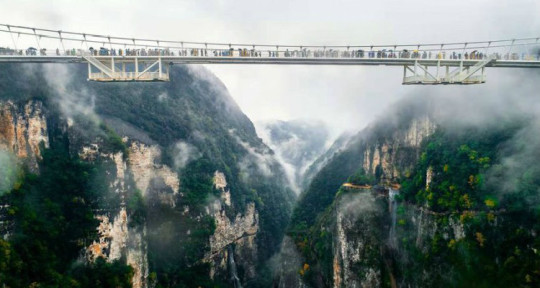
Yellow Dragon Cave
It’s a karst cave with lots of fantastic stalagmites, peculiar limestone formations and underground rivers. among those stalagmites, there is a most famous one, 19.2 meters high, shaped like a needle, called heaven's needle.

Tianmen Mountain
The highest mountain in Zhangjiajie, famous of the hole which called heaven's gate. This gate was created by cliff rocks collapsing in ancient time, it's 131 meters height, 57 meters width and 60 meters long. In 1999 the local government launched an activity that airplane flying through this hole. In recent years there is another activity called skyflying launched in Tianmen mountain, The professional sportsman who wear wingsuit, jump down from Tianmen mountain, flying through the heaven's gate, and landing in somewhere.
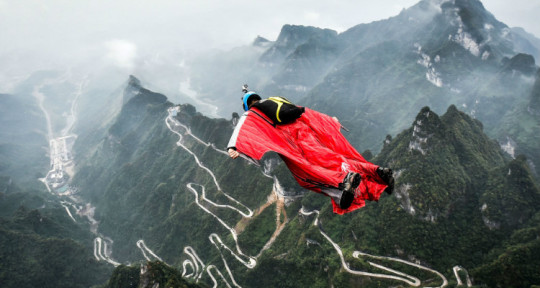
Suggested Zhangjiajie Tour Itinerary
Day 1: Zhangjiajie national forest park, visit Avatar mountain area and Tianzi mountain area, taking mountain elevator and cable car.
Day 2: Yellow dragon cave & Zhangjiajie Glass bridge, to explore the world's most beautiful karst cave, and walking on the world's highest glass-bottomed bridge.
Day 3: Tianmen mountain, taking world's longest cable way to see heaven's gate hole, ancient temple etc.
Also you can extend your tour to Fenghuang Ancient Town
Day 4: Furong ancient town & red stone forest park. Furong town where is ancient king's living place, famous of waterfall. And red stones were formed since Ordovician period.
Day 5: Dehang Miao village & Fenghuang ancient town. Dehang means beautiful valley where Miao minority people lived, Fenghuang is a historical and cultural town where is located in the border area between Hunan & Guizhou province.
After the tour finished, you don't need to get back to Zhangjiajie, as you can be departing from Tongren airport or Huaihua high-speed train station, which are closed to Fenghuang.
Have fun!
#zhangjiajie tour#zhangjiajie travel#zhangjiajie national forest park#avatar mountain#zhangjiajie glass bridge#fenghuang ancient town
6 notes
·
View notes